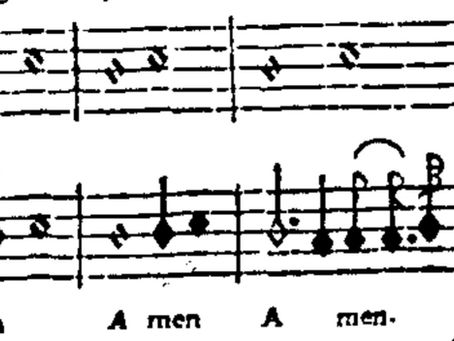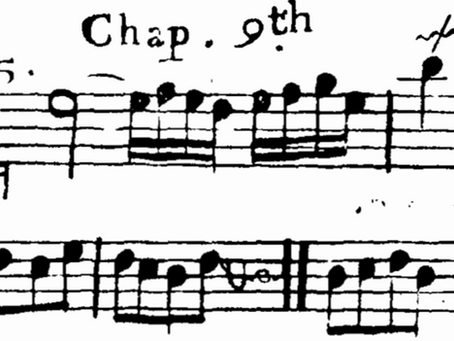top of page
Reimagining Historical Voices
Search


Pierre-Louis Pollio on the ‘Charivary’ of Improvising (‘Chant sur le Livre’) in Many Parts (1771)
‘As for singing on the book in many parts made impromptu, my sentiment is that it is almost impossible to do well… I maintain that it is...

Tim Braithwaite


Pietro Reggio on Teaching the Trillo (1677)
‘Now let us proceed to teach a man to Trillo, and what he must do, for to come to do it well. The first Trial is as follows. Let any...

Tim Braithwaite


Bovicelli on the Graceful Placement of Certain Syllables (1594):
‘As for the disposition of the words under the notes, it is necessary to take great care to set them so well, that not only no barbarism...

Tim Braithwaite


The ‘Tedious’ Tempo of English Psalm Singing in the Early 18th Century
‘But the greatest Difficulty is to sound every Note according to its due Measure of Time; and here it is that the Singers in most Country...

Tim Braithwaite


Thomas Morley on the Perils of Many Singers ‘Singing on a Plainsong.’
'As for singing upon a plainsong, it has been in times past in England, as every man knows, and is at this day in other places, the...

Tim Braithwaite


Jean-Jacques Rousseau’s Definition of Chant sur le Livre:
‘Singing on the book. A Plainchant or counterpoint in four parts, which the musicians compose and sing impromptu on a single [part]:...

Tim Braithwaite


English Psalm Singers ‘Tearing with their Throats one Wretched Stave into an Hundred Notes’: (1708)
‘Then out the People yawl an hundred Parts, Some roar, some whine, some creak like the Wheels of Carts; Such Notes the Gam-ut yet did...

Tim Braithwaite


Johann Samuel Petri’s Advice for Teaching a Congregation to Harmonise a Chorale Extempore (1767)
Question. How can one remedy the fault that a choir, when it sings a well-known church chorale without sheet music, as must often happen,...

Tim Braithwaite


Giovanni Battista Martini on Singing ‘all’improvviso’ on a Cantus Firmus (1774):
'Among the compositions made above a cantus firmus by the masters of the art, those [made] above introits are unique, and are used...

Tim Braithwaite


Adriano Banchieri’s ‘Hundred Passaggi’:
‘The hundred passaggi above, all having been printed in various works by modern authors, have been assembled with much study and...

Tim Braithwaite


Pietro Reggio on the Sliding ‘Accent’ (1677)
‘Now let us take notice, of singing long Notes Gracefully. Note the following Example. The first Note must begin softly, and then...

Tim Braithwaite


Giovanni Bononcini on reading in all keys and clefs using a six note solmisation system (1678)
*Notes* - The system (c.1500-1800) is based on three overlapping ’hexachords’ of six syllables - do re mi fa sol la. - In order to change...

Tim Braithwaite


Charles Burney on the Students at the Conservatorio of S. Onofrio: Wednesday 31st October 1770
This morning I went with young Oliver to his conservatorio of S. Onofrio, and visited all the rooms, where the boys practice, sleep and...

Tim Braithwaite


A Comparison Between Cathedral Singing and the Singing of David’s Psalms (1644)
Davids Psalms sung in our English Meeter differ much from Cathedrall singing, which is so abominable, in which is sung almost every...

Tim Braithwaite


Tosi on the Excesses of Modern (1723) Singers, and the Patience of the Waiting Orchestra
Ԥ 5. Every Air has (at least) three Cadences, that are all three final. Generally speaking, the Study of the Singers of the present...

Tim Braithwaite


Johann Hiller on improving the text setting of even ‘the best composers.’ (1780)
‘When several notes are sung to one syllable, the performance is called melismatic singing. Thus, every long or short extension of a...

Tim Braithwaite


Do Tosi and his commentators prefer too many or too few ornaments?
I was recently flicking through an instruction book aimed at teaching modern singers how to ornament eighteenth-century repertoire, and I...

Tim Braithwaite


Johann Friedrich Agricola (1757) and Wolfgang Caspar Printz (1678) on Choral Singing
‘The loudness or softness, especially on long and serious notes, must be observed even by those who sing the supporting voices [not the...

Tim Braithwaite


John Crompton on Suitable Voices for the Countertenor Part (1778)
‘Suitable voices for the middle, or counter part are rather difficult to find; but let no-one, for that reason, attempt it with a feigned...

Tim Braithwaite


Jean-Laurent de Béthizy on Singing with Instruments Using Artificial Tuning Systems (1764)
‘Note on this occasion that temperament is not the same on all instruments, it is inevitable, when many sorts of instruments play a piece...

Tim Braithwaite
bottom of page
